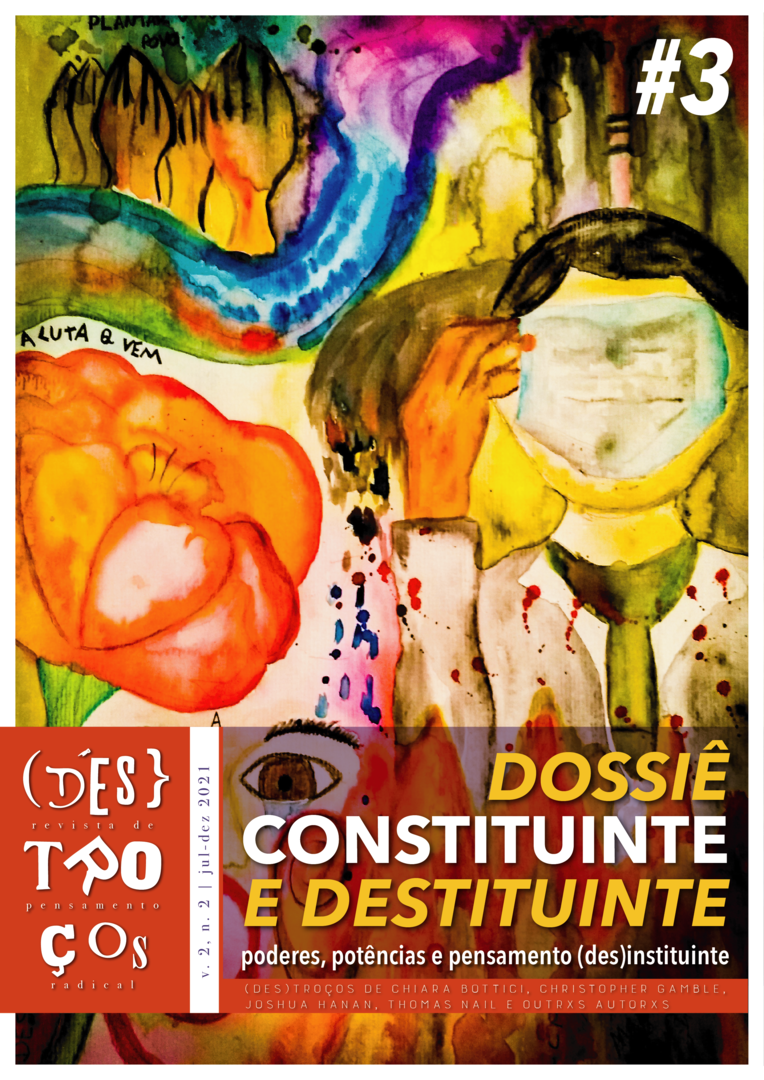Ecofeminismo como ecologia descolonial e transindividual
DOI:
https://doi.org/10.53981/destroos.v2i2.37737Palavras-chave:
feminismo, ecologia, colonialidade, patriarcado, democraciaResumo
Neste ensaio, combino o ecofeminismo descolonial com uma filosofia da transindividualidade. Esta última retrata uma forma de comunismo somático, em que cada individualidade é concebida como uma transindividualidade, que é um processo de devir que acontece no nível supra, inter e infra-individual. Ao questionar todas as fronteiras rígidas, junto com as hierarquias que as sustentam, uma ecologia transindividual também seria uma ecologia queer.
Downloads
Referências
ALAIMO, Stacy. Bodily natures: science, environment, and the material self. Indianapolis: Indiana University, 2010.
ARRUZZA, Cinzia. Le relazioni pericolose: matrimoni e divorzi tra marxismo e feminismo. Rome: Alegre, 2010.
BALIBAR, Etienne; MORFINO, Vittorio (eds.). Il transindividuale. Milano: Mimesis, 2014.
BALIBAR, Etienne. Spinoza: from individuality to transindividuality. Medelingen vanwege het Spinozahauis, n. 71, 1997.
BARAD, Karen. Meeting the universe halfway: quantum physics and the entanglement of matter and meaning. Durham: Duke University, 2007.
BEAUVOIR, Simone De. The second sex. New York: Vintage Books, 2011.
BENNET, Jane. Vibrant matter: a political ecology of things. Durham: Duke University, 2010.
BERROS, María Valeria. The Constitution of the Republic of Ecuador: pachamama has rights. Environment & Society Portal, Arcadia, n. 11, 2015.
BLANKENHORN, David. Fatherless America. American Experiment, 1993. Disponível em: https://www.americanexperiment.org/reports-books/fatherless-america/.
BOOKCHIN, Murray. The ecology of freedom: the emergence and dissolution of hierarchy. Oakland: AK, 2005.
BOTTICI, Chiara. Imaginal politics: images beyond the imagination and beyond the imaginary. New York: Columbia University, 2014.
BRAIDOTTI, Rosi. The posthuman. Cambridge: Polity, 2013.
BUTLER, Judith. Gender trouble. London: Routledge, 1990.
CHEN, Mel Y. Animacies: biopolitics, racial mattering, and queer affects. Durham: Duke University, 2012.
COCCIA, Emanuele. La vie des plantes: une métaphysique du mélange. Paris: Éditions Rivage, 2016.
COOLE, Diana; FROST, Samantha (eds.). New materialism: ontology, agency, and politics. Durham: Duke University, 2010.
DEBORD, Guy. The society of the spectacle. trans. Donald Nicholson-Smith. New York: Zone Books, 1995.
FRASER, Nancy, Fortunes of femininsm: from state-managed capitalism to neoliberal crisis. London: Verso, 2013.
FRASER, Nancy; Behind Marx’s hidden abode. New Left Review, n. 86, pp. 60-66, 2014.
HALBERSTAM, Jack. Trans*: a quick and quirky account of gender variability. Berkeley: University of California, 2018.
JAEGGI, Rahel. Alienation. New York: Columbia University, 2013.
JONES, Pattrice. Eros and the mechanisms of eco-defense. In ADAMS, Carol J.; GRUEN, Lori (eds.). Ecofeminism: feminist intersections with other animals & the Earth. New York: Bloomsbury Academic, 2014.
KOMPOROZOS-ATHANASIOU, Aris. Speculative communities: living with uncertainty in a financialized world. Chicago: The University of Chicago, 2022.
LUGONES, Maria. Towards a decolonial feminism. Hypatia, n. 4, 2010.
LURGIO. Jeremy. Saving the Whanganui. The Guardian, 2019. Disponível em: https://www.theguardian.com/world/2019/nov/30/saving-the-whanganui-can-personhood-rescue-a-river.
MARCUCCI, Nicola; PINZOLO, Luca (eds.). Strategie della relazione: riconoscimento, transindividuale, alteritá. Rome: Meltemi, 2010.
MIES, Maria; SHIVA, Vandana (eds.). Ecofeminism. London: Zed Books, 2014.
MIES, Maria. Patriarchy and accumulation on a world scale: women in the international division of labour. London: Zed Books, 1986.
MIES, Maria. The myth of catching-up development. MIES, Mies; SHIVA, Vandana (eds). Ecofeminism. London: Zed Books, 2014.
MIES, Maria. The need for a new vision: the subsistence perspective. MIES, Maria; SHIVA, Vandana (eds.). Ecofeminism. London: Zed Books, 2014.
MORTIMER-SANDILANDS, Catriona; ERICKSON, Bruce. Queer ecologies: sex, nature, politics, desire. Indianapolis: Indiana University, 2010.
MORTON, Timothy. Queer ecology. PMLA, v. 125, n. 2, 2010.
MORTON, Timothy. The ecological thought. Cambridge: Harvard University, 2010.
MURPHY, Michelle. Reproduction. In: MOJAH, Shahrzad. Marxism and feminism. London: Zed Books, 2015.
OELE, Marjolein Oele. E-Co-Affectivity: exploring the pathos at life’s material interfaces. Albany: SUNY, 2020.
OYĚWÙMÍ, Oyèrónkẹ. Conceptualizing gender: eurocentric foundations of feminist concepts and the challenge of african epistemologies. Jenda: a journal of culture and african women studies, v. 2, n. 1, 2002.
POVINELLI, Elizabeth A. Geontologies: a requiem to late liberalism. Durham: Duke University, 2016.
PREACIADO, Paul. Counter-sexual manifesto. New York: Columbia University, 2018.
PRECIADO, Beatriz. Testo junkie: sex, drugs, and biopolitics in the pharmacopornographic era. New York: The Feminist, 2013.
PULCINI, Elena. La cura del mondo. Torino: Bollati Boringhieri, 2009.
QUINN, Patrick J. Patriarchy in eclipse: the femme fatale and the new woman in american literature and culture, 1870-1920. Cambridge: Cambridge Scholars Publishing, 2015.
READ, Jason. The politics of transindividuality. Chicago: Haymarket Books, 2016.
RECLUS, Élisée. Histoire d’un ruisseau. Arles: Actes Sud, 1995.
ROY, Eleanor Ainge. New Zealand River Granted Same Legal Rights as Human Being. The Guardian, 2017. Disponível em: https://www.theguardian.com/world/2017/mar/16/new-zealand-river-granted-same-legal-rights-as-human-being.
SERRANO, Julia. Whipping girl: a transexual woman on sexism and the scapegoating of femininity. Berkley: Seal, 2007.
SHARP, Hasana. Spinoza and the politics of renaturalization. Chicago: University of Chicago, 2011.
SHIVA, Vandana. Decolonizing the North. In: MIES, Maria; SHIVA, Vandana (eds.). Ecofeminism. London: Zed Books, 2014.
SHIVA, Vandana. Decolonizing the North. In: MIES, Maria; SHIVA, Vandana. Ecofeminism. London: Zed Books, 2014.
SHIVA, Vandana. Staying alive: women, ecology, and development. Berkeley: North Atlantic Books, 1999.
SIMONDON, L’individuation à la lumiere des notions de forme et d’information. Grenoble: Edition Million, 2005.
SWORD, Rosemary K.M.; ZIMBARDO, Philip. The fatherless generation. Psychology Today, 2018. Disponível em: https://www.psychologytoday.com/us/blog/the-time-cure/201808/the-fatherless-generation.
UN WOMEN. Facts and figures: ending violence against women. 2020. Disponível em: https://www.unwomen.org/en/what-we-do/ending-violence-against-women/facts-and-figures.
UNITED NATIONS POPULATION FUND. Gender-biased sex selection. 2020. Disponível em: https://www.unfpa.org/gender-biased-sex-selection.
VERTER, Mitchell. The flow of the breath: Levinas mouth-to-mouth with Buddhism. In KALMANSON, Leah; GARRETT, Frank; MATTICE, Sarah (eds.). Levinas and Asian thought. Pittsburgh: Duquesne University, 2013.
WHYTE, Kyle. Settler colonialism, ecology and environmental injustice. Environment & Society, n. 1, 2018.
WORLD ECONOMIC FORUM. Global gender gap report 2020. 2019. Disponível em: https://www.weforum.org/reports/global-gender-gap-report-2020.
WYNTER, Sylvia. Unsettling the coloniality of being / power/ truth/ freedom: towards the human, after man, its overrepresentation - an argument. CR: The New Centennial Review, v. 3, n. 3, 2003.
Downloads
Publicado
Edição
Seção
Licença
Copyright (c) 2022 (Des)troços: revista de pensamento radical

Este trabalho está licenciado sob uma licença Creative Commons Attribution-NonCommercial 4.0 International License.



















